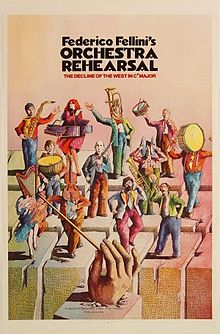
ORCHESTRA REHEARSAL
Italy, 1978, 69 minutes, Colour.
Baldwin Baas, Clara Colosimo, Elisabeth Labi.
Directed by Federico Fellini.
Orchestra Rehearsal is a brief film made by Fellini for Italian television and sponsored by R.A.I. It was made after Fellini's Casanova. Critics were not it favour of this film although it was shown at the Cannes Film Festival. Perhaps they expected something more flamboyant from Fellini. However, within the short running time and within the confined atmosphere of the rehearsal, Fellini has a great deal to say about contemporary Italy. Orchestra Rehearsal is an allegory. It is a concert rehearsal taking place in an old converted church. The conductor eventually uses fascist methods to try to control the orchestra. Each player is talented but eventually his personality dominates or gives rise to clash. At the end there is chaos. In the background are the men from the unions. The screenplay is partly predictable. However, that does not take away from the unfolding of the allegory before the audience and the audience's trying to identify the particular symbols. The film, perhaps, does not say anything profound but the presentation is, of course, incisive. One might consider the members of the orchestra rehearsal a group of Fellini grotesques as in his other films, but here very well dressed although behaving quite bizarrely. The film is not of great impact for non-Italian audiences as were Fellini's other films. However, it is interesting as part of his canon.
1. The work of Fellini, admiration for it? His cinema tradition over decades? His particular visual style? His point of view and interests about society? Italian society and its corruption? Church and state? Fascism? His work for television? The film as a political allegory?
2. The sponsorship of Italian television? Its brevity, the audience for which it was designed? The television style: close-ups, highlighting the characteristics of the characters, roaming over the orchestra as it played? The editing to highlight the chaos of the ending?
3. How effective an allegory fable? The symbolism? The possibility of making music and harmony? Each instrument and the player with talent, skill, creativity, artistic insight? The cross-section of instruments in the orchestra? The role of the conductor? Harmony, gradual disintegration, chaos and uncharacteristic behaviour? The insight into Italy via the orchestra?
4. Italy and the 20th. century? The initial emphasis on the traditions? The church, the caretaker, the coming to life of an orchestra within the framework of the church, the possibility of beauty, the musical tradition? The more modern types - as illustrated in appearance, manners, dress, hair styles etc.? The interviews and the words giving the points of view of the orchestra members? The organisation of the orchestra? The conductor? The experience of Italian chaos, Mussolini and fascism, the attempts at post-war construction and the continual bickering since World War Two?
5. The significance of the empty church, the explanation, the church as a setting for an Italian orchestra rehearsal? The old man and his setting up the stands for the orchestra, the humour and irony of the stands continuing the fall?
6. The arrival of the members of the orchestra, audience familiarity with this kind of procedure from orchestral concerts, the potential of the orchestra to make music and harmony, the individual-- as they arrived and took up their places, the set places in the orchestra for each instrument? The audience getting to know the orchestra members by their characteristics, look, manner, instrument? How easy was it to identify the members of the orchestra?
7. The importance of the TV being present? The late 20th. century and the emphasis on media and communication? Everybody giving their points of view to the media for public consumption? The media people being partly invisible? But controlling? The anonymous interviewers? The eagerness of the orchestra members to give interviews? Those hesitating? The various reactions, self-consciousness, garrulous types? The range of points of view?
8. Each player emphasising the importance and quality of the instrument he or she played? Emphasising its essential nature? Pride in the instrument? The over-emphasis on the individual, often at the expense of the orchestra? Seeing the orchestra in relation to the individual instrument? The potential for clash and chaos?
9. The conductor and his prestige, his treatment of the orchestra, his anger? The chaos in reaction to him? His inability to control? His retreat to his office, the significance of the interview and his points of view, his return and his attempt to regain control in an even stronger manner?
10. The union men, big and burly, their carrying on at the back, their conferences? A satirical poke at the inflation of the unions?
11. The different types, their friendships, the clashes, the failures in the possibility for getting harmony?
12. The violence of the actual disruption, the physical violence, the fighting, the graffiti around the orchestra room? Fellini's attempt to visualise chaos within the confines and context of the rehearsal?
13. The attempts to re-establish the orchestra, the compromises, the hurt individuals, the self-assertion even as people went back to play, the conductor and control?
14. The film as a quick overview of the history of Italian government, society and politics? Fellini's comment on the '70s in Italy - the possibilities for unity, the potential for clash, the need for a strong leader, Italian response to fascist rule? Fellini’s optimistic or pessimistic view about Italy?